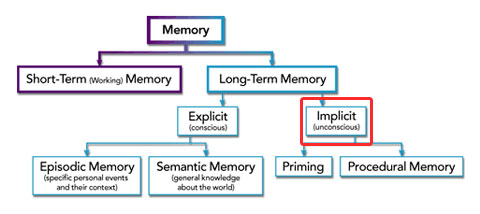A long-term type of memory that stands in stark contrast to explicit memory is called implicit memory – also known as ‘nondeclarative’ memory. This type of memory does not require conscious thought and allows you to do things through repetition. This type of memory flows effortlessly in our actions so can be difficult to verbalize.
Procedural Memory
Being able to carry out commonly learned tasks without having to consciously think about them is a type of implicit memory called ‘procedural memory’. Tasks that require procedural memory include things like:
 Tying your shoe
Tying your shoe Riding your bike
Riding your bike Driving your car
Driving your car Brushing your teeth
Brushing your teeth Washing the dishes
Washing the dishes
Procedural memory is even required for tasks that we would normally think of as “natural” such as walking. It can often be hard to verbalize exactly how to perform these tasks even though we can do them fairly easily. A different part of the brain is likely used for procedural memory than episodic memory since a brain injury might cause you to lose the one ability without actually losing the other ability. This is the reason that someone experiencing amnesia may forget about his or her personal life but retains the ability to use a spoon or ride a bike.
Priming
Your implicit memory can also be derived from what’s known as ‘priming’. You are primed to recall something that you have heard very recently or more frequently than something else. If, for example, you were asked to name a Canadian city that starts with the letters “Va” you would most likely answer Vancouver - unless you’ve had a more recent experience (or close personal connection) to another “Va” city like Vaughn or Val D’or - because you’ve likely heard about Vancouver more often. Things we have experienced more often result in neural pathways in our brain that are more salient than things we have experienced less often.
Long-term memory can weaken with cognitive conditions or age in the same way as short-term memory. The result is that procedures that were once quite easy for you can become more difficult. You might, for example, forget an important step when baking peanut butter cookies that you were certain you’d committed to memory and have baked a hundred times before.







 English
English
 Français
Français


